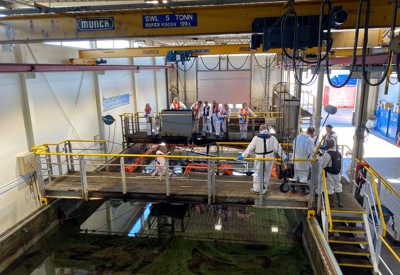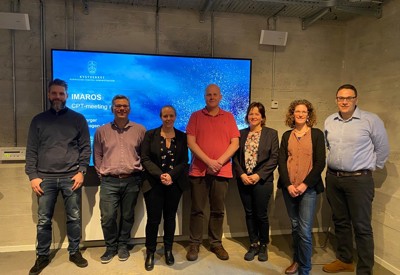In 2020 and 2021, the Norwegian Coastal Administration will lead the EU-funded project IMAROS, which will gather knowledge and experience from several countries to make recommendations on how best to implement oil spill response in the event of an oil spill of low sulphur fuel oil on water. The project is a collaboration between Norway, Sweden, Denmark, France, Belgium and Malta.
IMAROS
About the project
The aim of the project IMAROS is to develop recommendations for oil spill response involving the new generation of low-sulphur fuel oils, and to increase knowledge to understand potential environmental impacts from an accidental spill.
Successful oil spill response following ship incidents will reduce impacts on the marine environment and socio-economic impact on affected coastal communities.
Changes in the IMO regulations to reduce air emissions from ships have resulted in a "new generation" of fuel oils. These new types of fuel can be challenging in the event of accidental oil spills, and their behaviour after spills has not been researched much. Laboratory and basin testing so far has revealed a significant variety of the oils in terms of physical and chemical properties, as well as toxicity.
A ship incidents involving the new generation of oil can lead to serious impacts on the marine and coastal environment with subsequent challenges, as it can be difficult to remove the oil with conventional oil spill protection equipment and methods.
The aim of this project is to gather knowledge and experience from several countries and identify the most relevant products from the new generation of fuel oils used by ships in Europe. These oils will be analysed to identify different properties. Furthermore, the suitability of various response technologies and methods for spilling these new products will be identified through practical testing of equipment.
The overall goal is to develop recommendations for oil spill response involving the new generation of fuel oils. This includes methods for response at sea as well as on shorelines. This will enable participating states in the European Commission – Union Civil Protection Mechanism to invest in the most appropriate equipment and gain knowledge of the best possible methods of oil spill response. An effective response at sea will also reduce the amount of oil reaching the shorelines. The results can contribute to the development of more environmentally friendly marine fuel oil.
Will recommend oil protection equipment and methods for new low-sulphur fuel types
The Norwegian Coastal Administration will over the next two years work with partners in Sweden, Denmark, France, Belgium and Malta to find what responses will work best in the event of an oil spill of low sulphur fuel.
From 1 January 2020, the UN's International Maritime Organization (IMO) have made changes in their regulations in order to reduce emissions from ships. These changes have resulted in new types of fuel and an increase in use of low sulphur fuels.
In the event of an oil spill at sea, these new types of fuel oils could present challenges. Laboratory testing have shown substantial diversity of the fuel oils with regard to physical and chemical properties, as well as toxicity. This means that if an accident happens to a ship using low sulphur fuel, may result in severe impacts on the marine and coastal environment with subsequent challenges for responders, since it might be difficult to recover the oil with conventional oil spill response equipment and methods
Project partners
- Sweden: Kustbevakningen
- Denmark: Forsvaret og forsvarsministeriets styrelser
- France: Centre de Documentation de Recherces et d'Experimentation sur les Pollutions Accidentelles des Eaux Association
- Belgium: Institut Royal des Sciences Naturelles de Belgique
- Malta: Authority for Transport in Malta
The project is funded by EU. Read more here

